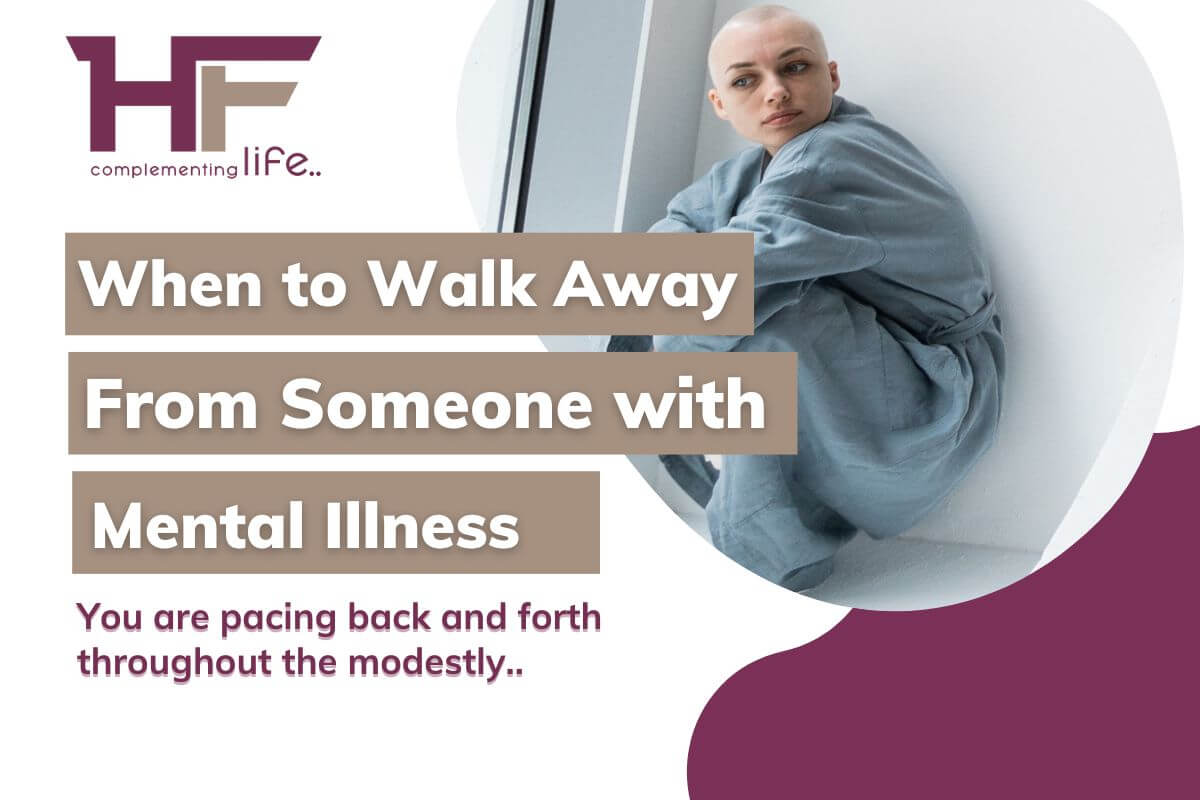When To Walk Away From Someone With Mental Illness? Imagine yourself in a scene –
It’s daytime, 11:13 am by the clock!
You are pacing back and forth throughout the modestly furnished living room. Upset to the core! And your abusive boyfriend, the so-called “man” in his early 30s, stands in your path, blocking your every move, trying to convince you why he behaved violently and is sorry; and would not behave like that again.
You are holding your patience!
You don’t want to speak because you know if you do, you might turn more resentful. So, you simply say, “Move out of my way. We shall talk about this later.” The very next moment, you get a mocking reply from him, “Really? Do we need to talk? How convenient of you!”
And
The conversation goes on, and more violent does it turn!
It’s when you need to leave! In other words, it’s when you walk away from that person!
Why?
How?
Discover below!
CContents
Walking away from Someone with Mental Illness: It’s Okay!
Physical, verbal, and emotional abuse is a mental issue; we all need to grow consciousness about it as a community today! This is because it evokes the question of life safety of many out there; who fear raising a voice against violent behaviors. The one who isn’t able to leave the person out of love and sympathy!
But,
Now, To all out there,
Here’s how and when to walk away from someone with mental illness, the abusive love in your life, the one you need to let go of for your and/or your children’s safety.
Of course, you may ask for medical care and attention to help the person recover from their present state of mind. But, when they refuse to take help despite the harm caused to the quality of life; you have, you need to leave! It’s okay!
Just because an individual is sick doesn’t mean they have the right to hamper your mental peace and stability and toll your emotional and physical self! Many times today, people even take advantage by using their mental disorder cards, and that’s not something you need to bear through!
When to Walk Away from Someone with Mental Illness: Types of Abuses!
Well, behaviors and attitudes in an individual can tell you when it’s time to leave the mentally-ill person in your life. According to psychological and clinical experts, there exist two types of patients. First are mentally and emotionally abusive patients, and others are physically abusive.
Some Emotional and Mental Abuses: Alert!
Mental and emotional abuse can be diverse, perhaps! They include –
- Blaming you for anything and everything that goes wrong in their life,
- Namecalling,
- Using abusive language and a rough tone when speaking to you,
- Expecting you to sacrifice all your needs and meet their first,
- Unnecessarily demanding things,
- Criticizing you for not completing all they have asked for,
- Making fun of your insecurities,
- Humiliating you all the time,
- Showing dissatisfaction and disregard towards everything you do, no matter how hard you try to please them,
- Manipulating you to go through guilt trips,
- Expecting that you would always share their opinions and perspectives as yours,
- Not paying any heed to your pain and concerns, and so forth!
Some Physical Abuses: Take Heed!
If you are wondering what accounts for physical abuse, they are –
- Slapping you,
- Pulling your hair,
- Choking you hard,
- Pushing you with extreme force,
- Leaving you alone in unfamiliar and unsafe places,
- Preventing you from taking prescribed medicines, withholding your prescription,
- Not letting you go out of the house,
- Throwing and damaging your stuff when angry, such as your phone,
- Threatening and warning you of physical assaults for doing something they don’t like the next time,
- Driving dangerously to frighten you when you are inside the car,
- Forcing you to consume alcohol or drugs,
- Taking up weapons to scare you, etc.
Create A Safety Plan When Walking Away From Someone With Mental Illness: How-to?
When breaking off with an abusive person in your life, be it your partner, parents, friend, or any close-dear one, you perhaps need to underscore the fixes you require to keep your life and that of; your children safe.
- Decide whether you need to leave home or travel to some new location.
- Reconfirm the location you’re moving in before you pack.
- Be precise about time management.
- Be in constant touch with your friends, relatives, or someone whom; you trust.
- Plan what to say to them and send a clear message virtual or in meeting in-person in some reliable public place.
- If you still want to continue the relationship, ask and encourage them to go for medical treatment.
- Be crystal about your boundaries with them now.
- Above all, be straightforward about the setbacks of their mental issues in your daily life.
Differentiate The Illness and The Person: Give your Best!
Remember, neither resentment nor pity works for mental issues that, as per psychology, involve significant cognitive, emotional, and behavioral changes in an individual, affecting family, social, and work lives. So, if you really love and care for them, you need to realize that the person you love and the illness are not the same! You need to do your part, no matter what!
Be Empathetic, Not Sympathetic
Empathy is the key to the human community dealing with mental issues and helping mentally-ill patients. You need to understand and experience the feelings of the individuals and accept their viewpoints too! Compassion is crucial when speaking or mixing with such patients!
Make Communication Clear and Open
You also have to be loud enough and tell them your issues! Let them know that your mental health and state of well-being are heavily affected and that too of theirs. Stand firm on your basic needs to live well! While your loved ones have communication difficulties, be clear about your thoughts, and be respectful.
Fetch Expert Guidance and Support
If you are in a dilemma about whether or not to end the relationship with the individual for life, you can also get expert support. Ask your partner to join in; to make things work out. Medical health professionals (licensed and trained therapists) can certainly help you both. The external points of view can be beneficial, indeed!
Final Thoughts:
Perhaps, you are the one to decide about your life from here on and act sensible and wise! You are the one to owe the responsibility to taking care of yourself and the close one of your mentally ill. Both are mutually inclusive. Yes, The latter isn’t plausible without the former. So, you have to be calm and fearless! You have to be gentle and vocal!
For more ideas and tips on dealing with someone with mental illness, stay tuned to www.healthfinder.in.










Comments